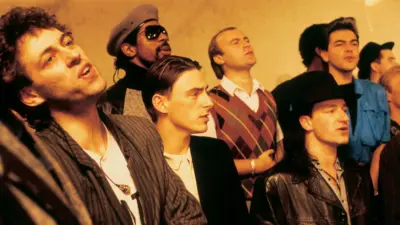We've updated our Privacy and Cookies Policy
We've made some important changes to our Privacy and Cookies Policy and we want you to know what this means for you and your data.
Measles in DR Congo: By air, boat and foot to deliver the vaccine
Image source, Johannes Tegner/│╔╚╦┐ý╩Í
For the past two years, the Democratic Republic of Congo has been grappling with the world's worst outbreak of measles, which has killed more than 7,000 children. The minister of health says the outbreak is over but experts say that with a relatively low rate of vaccination - just 60% - it is just a matter of time before there is another. Journalist Sara Assarsson and photographer Johannes Tegner meet the health workers going to great lengths delivering these vital but delicate supplies:
Image source, Johannes Tegner/│╔╚╦┐ý╩Í
Though you would not know it from his spotless shoes, Mulalu Lwesso often walks for up to six hours delivering vaccines to a rural health facility.
"I started studying nursing but couldn't afford to complete my education - now I help out where it's needed. It's a long walk and I'm getting old. I've walked this route every month since 1987," he says.
The 62-year-old makes the same journey from a hospital in the town of Mwenga - wiping his forehead, slinging the coolbox over his shoulder and heading back to his home village with vaccine capsules, syringes and other supplies in tow.
Image source, Johannes Tegner/│╔╚╦┐ý╩Í
Top Stories
Other methods of transport can pose challenges. Lorries can get stranded for days, even weeks, when heavy rains turn dirt roads into muddy fields. DR Congo, a country two-thirds the size of Western Europe, has just over 2,000km (1,250 miles) of paved roads.
Vaccines are heat-sensitive and become less efficient if exposed to high temperatures.
Image source, Johannes Tegner/│╔╚╦┐ý╩Í
Manufactured in India and flown into eastern DR Congo's economic hub, Goma, these measles vaccines are then transported by boat to a cold storage room at Bukavu General Hospital.
"It should be between 6C and 7C in here, but we only have electricity during certain hours of the day," says Oscar Mutama, who is in charge of vaccine distribution for the wider South Kivu province.
"In the event of a prolonged power outage, we cannot guarantee the vaccines maintain the highest quality. We have recently introduced new routines for registering damaged products, but we don't have the capacity to perform thorough quality controls."
Image source, Johannes Tegner/│╔╚╦┐ý╩Í
At the next stage of the journey the petrol money has run out, leaving Mr Lwesso to take the cool bag the final 30km (18 miles) by foot - the team having already decided that a motorcycle taxi would be too costly.
DR Congo's crippled health system survives on threadbare resources, and the eastern region is beset by armed conflict as well as humanitarian crises, and poverty is many people's daily reality.
Image source, Johannes Tegner/│╔╚╦┐ý╩Í
With the batches now delivered, nine-month-old Zawidi is to receive her first vaccine.
All her siblings have been immunised against polio, measles, tetanus, diphtheria and mumps.
Yet one of them contracted measles during the country's latest outbreak. "He didn't become seriously ill, but I was still worried about him," says their mother Tantine Katangalo.
She sets off with Zaiwidi, walking for nearly two hours to reach the health centre. With people "scattered in the hills" and having "few transport options", the vast distances parents have to travel make it quite an effort, says Mwenga's head of medicine Arsène Mubuto.
Top Stories
Image source, Johannes Tegner/│╔╚╦┐ý╩Í
Armed militias have forced tens of thousands of people to flee their homes here over the years.
"We call them conflict commuters," says Dr Mubuto. "When there is unrest in an area, people move to a neighbouring village and then move back home."
Despite these circumstances, however, he says much has already been achieved locally: "When we discovered measles in 2019, we acted quickly and mass vaccinated everyone. It seems to have succeeded."
What is measles?
Measles is a virus that initially causes a runny nose, sneezing and fever.
A few days later it leads to a blotchy rash that starts off on the face and spreads across the body.
Most people will recover, but measles can cause life-long disability. It can be deadly, especially if it causes pneumonia in the lungs or encephalitis (swelling in the brain).
It is estimated that 110,000 people die from measles each year around the world.
Top Stories
Image source, Johannes Tegner/│╔╚╦┐ý╩Í
"Most parents choose to come here with their children even though they live far away," says Nurse Doms Mushimgwa at Iganda health centre outside Mwenga.
"There is no vaccine resistance."
Image source, Johannes Tegner/│╔╚╦┐ý╩Í
"In some areas, as many as half of all children do not have access to vaccines at all," says Jorge Caravotta, a health expert at the UN's children's agency, Unicef.
"During the Ebola outbreak, we saw that routine vaccinations decreased by 25%, which led to an extensive measles outbreak throughout the country."
And as local hospital boss Dr Mubuto points out: "Even if we could [one day] reach 100%, some vaccines are destroyed already when they reach the hospital."
Image source, Johannes Tegner/│╔╚╦┐ý╩Í
More than 7,000 children under the age of five have died since the latest measles outbreak began in 2018, according to DR Congo's health ministry.
Malnutrition puts children at higher risk, and also make it difficult for the vaccine to work in their systems, Unicef's Jorge Caravotta says. "Another problem is that some vaccines don't have lifelong protection and several doses are needed.
"It's a huge challenge to convince parents that vaccines are the best way to prevent diseases while at the same time seeing their children get sick even though they have been vaccinated."
Image source, Johannes Tegner/│╔╚╦┐ý╩Í
"Most children that we treat are either acutely or chronically malnourished," says Aline Nabintu, a doctor at Mwenga District Hospital.
"We give them Plumpy'nut [a peanut paste] which is an emergency measure. Then we can do little more than send them home.
"We see the same children come here for treatment again and again. It is extremely difficult and frustrating."
Image source, Johannes Tegner/│╔╚╦┐ý╩Í
With his vaccination rounds complete, Nurse Mushimgwa locks up the maternity ward next door. He points to the few instruments available: a spool of thread, a pair of pliers and a simple stethoscope. Complicated deliveries are sent on to the hospital in Mwenga.
But not everyone makes it and maternal mortality is high. Although infant mortality rates in DR Congo have halved since the late 1990s, .
"Vaccination is the best life insurance. If the children become ill, many parents cannot afford to seek healthcare," says Mr Mushimgwa. "But it is important that the vaccine arrives here on time and that they work as they should. Otherwise it will be a false security."
All photos subject to copyright.
Top Stories
More to explore
Most read
Content is not available








